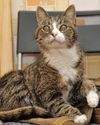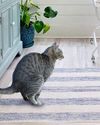
The obvious reasons may range from a medical problem to cats not liking their litter, where the litter box is placed in the house, or the litter box itself. It is important to consider several potential motivators to house soiling, including age. For instance, we should think about when the soiling began and how it has progressed over time.1 Figuring out what your cat is trying to tell you may involve putting on your detective hat to uncover any and all possibilities that may contribute to the soiling behavior. In this article, we will discuss some considerations to help understand why a cat may choose to stop using a litter box. Factors to consider are physical and/or biologic changes, the floor plan of the home, the location of the soiling as compared to the location of the litter box, and when it may be time to use medications. While unbelievably frustrating, the senior cat is trying to communicate its preference when soiling outside the litter box. It is up to pet owners to decipher the code. The first step is a visit to the veterinarian to rule out a medical condition.
Physical Examination
If you have more than one cat, hopefully you have figured out which one is soiling. If not, work with your veterinarian, who can prescribe a non-toxic identifier that will show up in urine or feces to determine the culprit. After you have identified the cat, it is important to have a physical exam and (if indicated) diagnostic testing. Because cats often do not show symptoms of illness,1 diagnostic tests will help to pinpoint a medical issue. In a longitudinal study reported by Morier, et al., (2024), frequent veterinary physical assessments are valuable in otherwise healthy senior cats age seven years or greater to detect non-apparent disease to provide early intervention.2
Esta historia es de la edición October 2024 de Cat Talk.
Comience su prueba gratuita de Magzter GOLD de 7 días para acceder a miles de historias premium seleccionadas y a más de 9,000 revistas y periódicos.
Ya eres suscriptor ? Conectar
Esta historia es de la edición October 2024 de Cat Talk.
Comience su prueba gratuita de Magzter GOLD de 7 días para acceder a miles de historias premium seleccionadas y a más de 9,000 revistas y periódicos.
Ya eres suscriptor? Conectar

Life With Patrick
Patrick and Mount Doom

Feline Photographers Part 1
\"Cats never strike a pose that isn't photogenic.\" - Lillian Jackson Braun

The Cat Fancy Alphabet
\"The Cat Fancy Alphabet\" is a new feature in Cat Talk. It highlights various terms and aspects of the cat fancy, educating fanciers new and old about our hobby.

UP CLOSE AND Purr-sonal
If there is one person, or even just a name, that anyone in CFA (Cat Fancier Association) knows, it would have to be Allene Tartaglia. It might be from her involvement with most aspects of the operations of CFA in her position of executive director. Or perhaps from her deep involvement with both the CFA Annual meeting and/or the International Show. Cat Talk thought it was time to learn more about one of the most key people in CFA.

Vision and Hearing Dysfunctions in Senior Cats
Just as people are challenged by having deficiencies with vision and hearing over time, so are senior cats. In senior cats, pet owners may notice their cats are no longer responding to them in the same way; however, it may be difficult to figure out.

Senior Cats and House Soiling
Why is my cat no longer using its litter box? Cat soiling in the house is one of the most talked about issues for pet owners.

Nutrition for Our Senior Cats
From the time they are born, our kittens receive a tremendous amount of care, with diet being at the core of their growth and development.

Fluffy's Sixteen and STILL Plays Like a Kitten!
Enrichment for Senior Cats

Alternative Arthritis Treatments for Cats
Just like humans, cats can experience arthritis. About 90% of cats over the age of 10 years experience osteoarthritis (OA) in at least one joint.1 It is a complex condition involving inflammation and degeneration of one or more joints and is sometimes referred to as degenerative joint disease (DJD). Cats with OA experience pain and inflammation in various joints that interfere with daily activities.

Checklist For What to Look For in Your Club's Next Show Venue
Show Manager To Ring One, Please